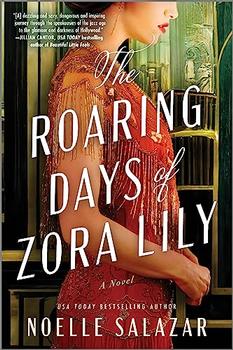Summary | Excerpt | Reading Guide | Reviews | Beyond the Book | Readalikes | Genres & Themes | Author Bio

A Novel
by Noelle Salazar
In Lu I'd found not only the perfect work companion, but a kindred spirit. Over the nine years we'd worked together, we'd enjoyed laughing over our shared love of no-nonsense ponytails, and waxing poetic about old films and vintage fashion. We sat in her living room or mine, rewatching the movies that had shaped us and sharing stories of our schoolgirl walls plastered with images of iconic women of the silver screen, while our schoolmates favored posters of half-clothed men. So, when the idea for the newest exhibit started floating around our superiors' offices upstairs, we'd spent many a night poring over which films we'd choose if asked, and then deliberated, scrapped, and chose again until we had the perfect array.
Out of curiosity, we began to inquire with movie studios about the costumes we'd be interested in displaying, running into new obstacles with each call we made. Several times we chose a beloved film only to find half the costumes had been lost in a fire, were part of a decades-long legal battle, or were just plain lost—a travesty over which we consoled ourselves with a huge plate of nachos and a pitcher of margaritas. Eventually, the decisions about which movies to include boiled down to three simple things: Where were the costumes we'd need? Would they be available to us for the time required? And what kind of shape were they in?
Once we'd gotten the green light that the exhibit was on, we finalized our list, made the calls, gathered confirmations, and began the design for the wing the costumes would be shown in. And then we waited, barely able to contain ourselves as one by one the garments that would be featured in The Hollywood Glamour Exhibition arrived.
We chose two movies per decade, going back one hundred years to the 1920s. Every piece that had been worn by the female lead was sent to us from studios, museums, or estates. Once in our possession, my job as costume curator, along with my staff of seven, was to remove each gown or outfit from its protective garment bags or boxes, and go over it with a fine-tooth comb, looking for tears, stains, missing buttons, and the like. We'd been working for months. Some of the more intricate gowns needed extensive rebeading or sequin replacement, and many of the older pieces needing patching inside to hold the outside fabric together. In two cases we'd had to sew exact replicas of the linings, and then carefully fit them inside the original, giving it something to cling to, extending its life.
A pantsuit from the forties had lost an outside pocket and matching the fabric had been hell. The brim of an iconic straw hat that belonged to another outfit had been scorched by a cigarette and needed to be patched. Each garment presented its own set of unique problems, and we were giddy as we worked to solve each puzzle.
With our intention for each item to be viewed from all sides, it was crucial they looked as flawless as possible. Thankfully, my team were experts in their field, and excited at the opportunity to handle costumes worn by some of the most famous women in film history.
"Can't believe we're down to the final film," Lu said, running a finger over a strip of fringe hanging from a black evening gown. "I think this batch is my favorite."
I nodded, taking in the room of costumes from the 1928 film The Star. Each piece had been worn by the iconic Greta Garbo and was the epitome of elegance and class. And a notable diversion from the designer's usual style.
"It's so odd Cleménte changed her MO for this one film," I said, tilting my head as I took in the distinct wide neckline featured in each of the eight pieces. Even a blouse and jacket had been designed to show off the actress's collarbones. The pieces were alluring, but Cleménte had always been known for a more modest style.
Michele Cleménte had been a well-known designer in the '20s and '30s, her signature style demure, with higher necklines and longer hems. But for this movie, she'd completely diverged.
Excerpted from The Roaring Days of Zora Lily by Noelle Salazar. Copyright © 2023 by Noelle Salazar. Excerpted by permission of Mira Books. All rights reserved. No part of this excerpt may be reproduced or reprinted without permission in writing from the publisher.
The less we know, the longer our explanations.
Click Here to find out who said this, as well as discovering other famous literary quotes!
Your guide toexceptional books
BookBrowse seeks out and recommends the best in contemporary fiction and nonfiction—books that not only engage and entertain but also deepen our understanding of ourselves and the world around us.